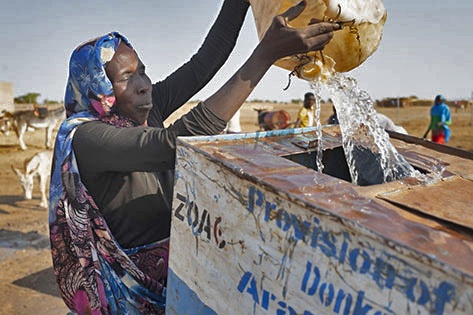The race is on to realise the most fundamental of the Sustainable Development Goals (SDGs) – ensuring that everyone has access to water, sanitation and hygiene services – by the 2030 deadline, says ForAfrika disaster response director Charles Wentzel.
There are six years to go, and ForAfrika, the largest African humanitarian development organisation, is doing its best to bring water, sanitation and hygiene (WASH) services to as many people as it can in the countries in which it works: Angola, the Central African Republic, Ethiopia, Mozambique, Rwanda, South Africa, South Sudan and Uganda. The SDGs are a set of 17 global objectives established by the United Nations to address social, economic and environmental challenges and promote sustainable development worldwide by 2030.
“Everywhere we work, we collaborate with other development organisations so that resources are effectively allocated, and there is no doubling up. Most important of all, however, is that we work with communities to ensure that the services we help them to provide tie in with their goals and aspirations,” Wentzel says ahead of World Water Day on 22 March.
In 2023, ForAfrika reached 463 191 people with WASH services, installing 140 wells, 448 handwashing stations and 2 392 toilets. In its 40 years of existence, it has sunk an estimated 4 250 wells, Wentzel says.
The United Nations has warned that by 2030, water scarcity could displace up to 700-million people in Africa, emphasising the urgent need for effective solutions to address this crisis. Experts predict that as early as 2025, 460-million people in Africa will live in water-stressed areas and that nearly 50% of Africa’s projected population of 1.45-billion people will face water stress or scarcity.
ForAfrika has learnt many lessons in its years of providing WASH access to communities, including in the aftermath of natural disasters such as cyclones and amid the fallout from conflict, Wentzel says.
One of the most important lessons learnt is that it is crucial that organisations work with communities to establish what their needs and long-term plans are so that any services or resources provided slot in with that bigger picture.
“ForAfrika has found that helping a community establish a water committee to oversee access and ensure maintenance of any installed resources and equipment is crucial. Community ownership is very important if a project or installation is to have longevity,” Wentzel says.
It is also important to have qualified technical staff overseeing water access operations, and it is critical that development organisations collaborate so that their actions are well coordinated and resources and services are not oversupplied, or overlooked.
Climate experts predict that Africa, already a water-scarce continent, will experience more significant water shortages in the years to come. Already Horn of Africa countries like Somalia, Ethiopia and Kenya are facing a sixth consecutive failed rainy season. This has led to severe hunger, with the World Food Programme reporting that 13-million people across these countries and the autonomous region of Somaliland are affected.
“Africa is our home. We want to see that everyone in Africa has access to WASH services, and enjoys food security, which is, in part, dependent on water being available for irrigation. We need to keep working at this enormous challenge,” says Wentze.










